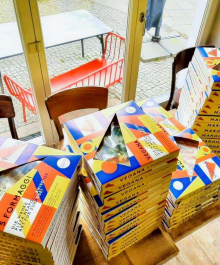

Elon Musk once said, “The only thing that makes sense is to strive for greater collective enlightenment.”
This was very much the theme of the Tech Open Air 2016. It’s clear that tech is no longer just ‘new technology’ for modern convenience. It now encompasses sex, philosophy, our understanding of beauty as well as the entirety of our lives and the human condition.
Understanding Beauty – Finding Beautiful and Relevant Photography through Machine Learning – Lorenz Aschoff
For example, Lorenz Aschoff asked the question, “Can we understand beauty?” when he started EyeEm, an online marketplace for photography. Beauty, after all, has been debated by mankind for millennia. The subject of countless songs, poems and works of art. The very reason why Menelaus set out to burn Troy. It’s still hotly debated today.
To discern the good photos from the bad, his team developed software to determine whether the cold and indifferent eye of a machine could recognise and identify beauty. Not an easy challenge when the very concept of beauty is highly subjective. By teaching the software using the photographs of master photographers, Lorenz and his team might have done just that. And while it’s enough to keep their hands full at the moment, in the future, they have set their software the challenge of understanding and identifying what defines art. It’s an arduous undertaking indeed, because, as he said in conclusion, even we aren’t sure.
Why the Next Big Thing in Tech is Disrupting Sex – Cindy Gallop
As well as beauty, the nature and future of sex was discussed at length. With an incendiary stage presence, Cindy Gallop spoke out about the skewed reality of sex peddled by the porn industry and what she saw as the “homogenisation of sex”. As an alternative, she created “MakeLoveNotPorn”, a website which aims to start conversations about how real people, in the real world, have sex.
MakeLoveNotPorn offers users very real sex videos “of the people, by the people”. Cindy Gallop’s hope is that this will present a more grounded, balanced and realistic view of how real peoples’ sex-lives can be. Currently in its beta phase, users are able to rent ‘real world sex’ videos for $5 a video.
What are these ‘real world sex’ videos, I hear you cry? That’s just it. Anyone can become a MakeLoveNotPornstar by submitting their own videos for curation, and in return they earn 50% of whatever profit the content draws in. Fucking sweet deal? I think so.
Not only will this allow people to openly profit from their love-making (whether it be with their significant other, or otherwise), it will also help shed the stigma surrounding sex, gender roles and sexual expectations that a very male-centric porn industry has grafted around us.
“Do Me Up The Bot” – Sex, Robotics and the Future of Fornication – Alix Fox; Andrew Smart; Stephanie Alys; Alexander Gorlach
Passionate sex strictly between people seemed to be the last thing up for discussion between Andrew Smart, Stephanie Alys and Alix Fox, a sex educator and journalist for the Guardian. Their discussion centred on technology and its role in our sex-lives. I’m talking about VR sex.
VR sex is spreading quickly, offering new scope and angles to the porn and sex industry. For example, one is already able to watch live cam girls while hooked up to an Oculus Rift, or even swap and experience other genders mid-fucking. And this is only the present.
The future, they said, would contain a smart sex toy that curates the sexual mood to suit its users. It would adjust the lighting, the temperature, and know whether dark beats from Paul Kalkbrenner or some country tunes from the Bosshoss would be more likely to turn up the heat during your throes of pleasure.
The group went on to discuss AI and sex. Would computerised sex workers exist and how far would their rights extend? Would consent be an issue? What about rape by an AI? This raised a plethora of moral, ethical and legal questions which led Fox to ask us: “Would you have sex with a robot?” After a few people shyly nodded, she continued, “Okay, who’s had sex with a human that felt like fucking a robot?”
Wearables for the Future – Martin Weigel; Matteo Lai; Karsten Lemm
Sex toys were not the only gadgets on the table, however. The future direction of wearable technology was put under heavy scrutiny. Current wearables, they said, seem to lack in pragmatism due to their small size. A watch that tracks your steps or allows you to answer phone calls is fun, but it’s nothing particularly ground-breaking.
Prototype concepts such as the iSkin, a thin and flexible non-conductive silicone, showed the potential of how wearables in the future won’t be confined to the wrist or ankle, but will be able to be placed anywhere on the body.
It will allow humans to bond, albeit temporarily, with technology. The uses for such a product are myriad. Sensors all over the body will be able to give constant, accurate body biometrics – things such as temperature, pulse, blood pressure and maybe even blood sugar levels could be measured and uploaded to a health practitioner for studying. Essentially, your wearables could look after your health and well-being 24 hours a day, caring for you in a way us adults haven’t been since we were children.
Makers and artists. Technology and humanity. Both at seemingly opposite ends of a spectrum, but tangentially if not symbiotically related. The progression of one will no doubt lead to a closer development and understanding of the other. It seems that all those who spoke and attended Tech Open Air understood this and are actively striving to bring the two together. And where better than a city where experimentation and innovation are the cornerstones upon which it was built?
Tech Open Air 2016
Visit EyeEm’s website.
Visit MakeLoveNotPorn.
Find out more about iSkin.
Tech Open Air’s website.






